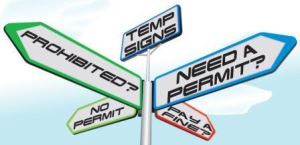Need a new sign for your business? Permitting for signage is necessary (and the law) and is best to be completed by signage professionals such as Butler Sign Co. The permit process fluctuates in complexity as it can be extensive and intricate at times. Typically (in best interest of our clients) – it helps to have experience and familiarity with this process. Butler Sign Company helps to remove the guess work from the equation. As every township is different, and, from our experience, we can tell you that most local governments have special zoning requirements and restrictions regarding the types and locations of signs businesses are allowed to install.
At Butler Sign Co., we know what it takes to navigate the red tape of the permit process and, if necessary, how to obtain variances. We handle this aspect for our clients on a daily basis, making the sign development process as painless as possible for all involved.
Based in New Jersey, Butler Sign Co. designs, fabricates, installs, and services quality signs and awnings throughout the state and Northeast region. We provide all types of signage, including illuminated signs, electronic message boards, monuments, carved signs, pole signs, pylon structures, awnings, lighting and more.
Over the past three decades, we’ve worked in every county and just about every town in NJ, helping businesses get the signage they need in a quick and concise manner.
Here’s how we work:
Step 1: Complete a Field Survey-
The failure to complete a thorough field survey is typically the reason in which a signage project may fail. A field survey consists of producing detailed measurements and photos of the sign site as well as all existing signage. These necessary steps provide our designers, fabricators and project managers with all of the crucial information needed to move forward with a project.
Step 2: Establish the Zoning Requirements
Once the field survey is complete, our permitting team will contact the municipality to determine site-specific rules and regulations for the desired signage. Every township has different sign codes and regulations, and those rules will determine how large your signage can (or can’t) be. Zoning regulations also specify the type of signs allowed in terms of their construction, illumination and installation methods.
Step 3: Compile the Correct Documentation
Providing complete packages of documentation that accompanies the permit application according to the municipality’s guidelines is a must—and timing is the biggest reason why.
Just as municipalities have different regulations for the type of signs that are allowed, they have different requirements for applications as well. Failure to apply for a required permit –or failure to provide the correct documentation with a permit application—can result in daily fines from the municipality until the proper permit is obtained.
Step 4: Maintain Contact with the Municipality for Permit Status Updates
By law, many municipalities have 20 days to approve or deny a permit. In many cases…it does not take this long. That’s why Butler Sign Co. looks out for the best interest of our clients and follows up with the permitting office to see if your sign plan has been approved.
When you come to Butler Sign Co., rest assured that we will diligently handle your permitting so your signage project can move ahead smoothly, with minimal hassle and time.
When you require professional signage to represent your business, Butler Sign Co. will work quickly with you to manage the entire sign development process — from the day of project inception to the day of installation. Give us a call at 973-633-5757 or visit our website to learn more about how we can make the sign development process so easy – and without headaches – for you!





You must be logged in to post a comment.